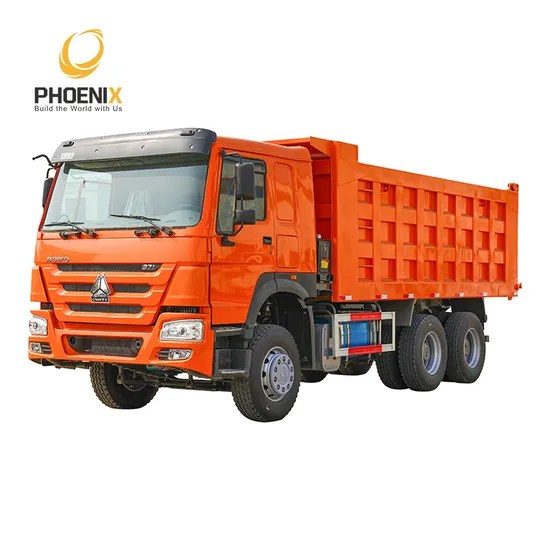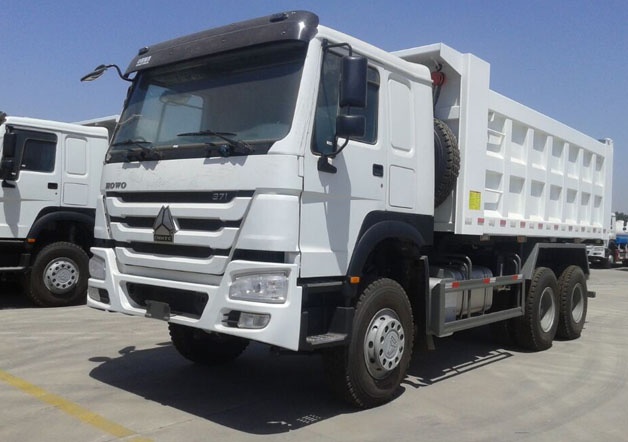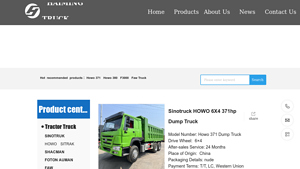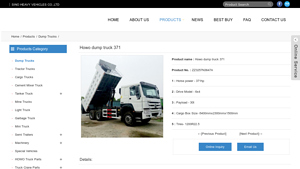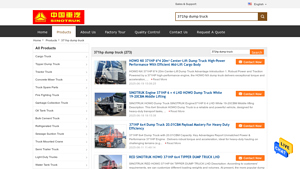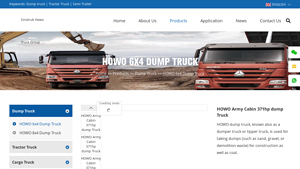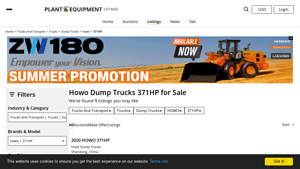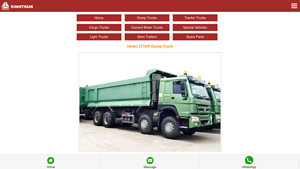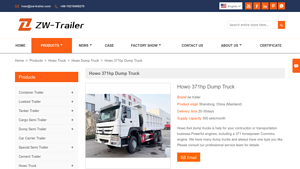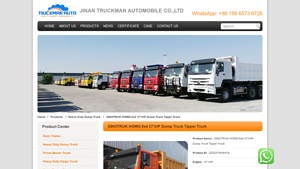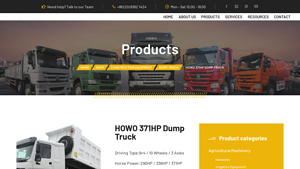Introduction: Navigating the Global Market for 371hp Dump Truck
In today’s dynamic global market, sourcing the right 371hp dump truck poses significant challenges for international B2B buyers. With various models available, including the renowned Sinotruk HOWO, understanding the nuances of specifications, performance, and adaptability to diverse operational environments is crucial. This guide serves as a comprehensive resource, addressing key areas such as the different types of 371hp dump trucks, their applications across construction, mining, and logistics, and critical factors for supplier vetting.
International buyers, especially those in regions like Africa, South America, the Middle East, and Europe—such as Saudi Arabia and Germany—will find valuable insights into cost considerations, shipping logistics, and after-sales support. By equipping buyers with in-depth knowledge, this guide empowers them to make informed purchasing decisions that align with their operational needs and budgetary constraints. Whether you’re looking to enhance your fleet’s efficiency or ensure compliance with regional regulations, navigating the complexities of the 371hp dump truck market has never been easier.
Through strategic insights and actionable advice, this guide aims to streamline your procurement process, mitigate risks, and ultimately contribute to the success of your business operations.
Understanding 371hp Dump Truck Types and Variations
| Type Name | Key Distinguishing Features | Primary B2B Applications | Brief Pros & Cons for Buyers |
|---|---|---|---|
| Standard HOWO 371hp | 6×4 drive, payload capacity of 25-30 tons, Euro II engine | Construction, mining, heavy material transport | Pros: Reliable performance, versatile; Cons: Limited to specific road conditions. |
| Center-Lift HOWO 371hp | Mid-lift cargo body, optimized for load distribution | Aggregate transport, road construction | Pros: Enhanced stability under load; Cons: May require more maintenance. |
| Heavy-Duty HOWO 371hp | Reinforced chassis, higher payload capacity (up to 30 tons) | Mining, heavy-duty construction sites | Pros: Exceptional durability; Cons: Higher initial investment. |
| Tipper HOWO 371hp | Ventral lift system, tailored cargo dimensions | Bulk material handling, waste management | Pros: Efficient unloading; Cons: Limited to specific cargo types. |
| Specialized HOWO 371hp | Customizable features, varying cargo body designs | Specialized transport needs | Pros: Tailored solutions; Cons: Potentially longer lead times for production. |
What Are the Characteristics of Standard HOWO 371hp Dump Trucks?
The Standard HOWO 371hp Dump Truck is characterized by its robust 6×4 drivetrain and a payload capacity ranging from 25 to 30 tons. This model is particularly well-suited for construction and mining applications, where reliability and versatility are paramount. B2B buyers should consider the truck’s performance on various road conditions, as it excels in rugged environments but may face limitations on smoother surfaces.
How Does the Center-Lift HOWO 371hp Differ?
The Center-Lift HOWO 371hp features a mid-lift cargo body designed for optimal load distribution, making it ideal for transporting aggregates and materials in road construction. This model enhances vehicle stability under heavy loads, which is crucial for safety in challenging environments. Buyers must weigh the benefits of improved load management against potential increases in maintenance requirements.
What Makes Heavy-Duty HOWO 371hp Trucks Ideal for Mining?
Heavy-Duty HOWO 371hp Dump Trucks are built with reinforced chassis and can handle higher payloads, making them perfect for mining operations and heavy-duty construction sites. Their exceptional durability ensures they can withstand the rigors of demanding applications. However, B2B buyers should be prepared for a higher initial investment compared to standard models, reflecting the truck’s enhanced capabilities.
Why Choose Tipper HOWO 371hp Trucks for Bulk Material Handling?
Tipper HOWO 371hp Dump Trucks are equipped with a ventral lift system that facilitates efficient unloading of bulk materials, making them ideal for waste management and construction sites. The tailored cargo dimensions allow for the transport of various materials, although buyers should note that this model may be limited to specific types of cargo, which could affect versatility.
How Can Specialized HOWO 371hp Trucks Meet Unique Transport Needs?
Specialized HOWO 371hp Dump Trucks offer customizable features, allowing buyers to tailor cargo body designs to meet specific transport needs. This adaptability is beneficial for businesses with unique operational requirements. However, potential buyers should consider that these customizations may lead to longer production lead times, impacting delivery schedules and project timelines.
Key Industrial Applications of 371hp Dump Truck
| Industry/Sector | Specific Application of 371hp Dump Truck | Value/Benefit for the Business | Key Sourcing Considerations for this Application |
|---|---|---|---|
| Construction | Transporting construction materials such as sand, gravel, and concrete | Efficient bulk transport reduces project time and labor costs | Durability for rough terrains, payload capacity, and after-sales support |
| Mining | Hauling minerals and ores from extraction sites to processing plants | Increases productivity by minimizing downtime and enhancing load efficiency | Compliance with mining regulations, fuel efficiency, and maintenance services |
| Agriculture | Carrying soil, fertilizers, and harvested crops to processing or storage areas | Streamlines logistics, reducing transportation costs and labor | Versatility in cargo body design and adaptability to various agricultural needs |
| Waste Management | Collecting and transporting construction and demolition waste | Enhances waste disposal efficiency and supports environmental compliance | Robust build quality for heavy loads and availability of spare parts |
| Infrastructure Development | Moving materials for road and infrastructure projects | Supports timely completion of projects, contributing to economic growth | Compatibility with diverse road conditions and reliable performance in various climates |
How is the 371hp Dump Truck Used in Construction Projects?
In the construction sector, the 371hp dump truck is essential for transporting bulk materials like sand, gravel, and concrete. Its robust design and high payload capacity (up to 30 tons) allow it to efficiently handle the demanding logistics of construction sites. This capability significantly reduces project timelines and labor costs by ensuring that materials are delivered promptly. International buyers, particularly from regions like Africa and South America, should consider sourcing trucks that can withstand harsh terrains and offer strong after-sales support to minimize downtime.
What Role Does the 371hp Dump Truck Play in Mining Operations?
The mining industry relies heavily on the 371hp dump truck for hauling minerals and ores from extraction sites to processing facilities. Its powerful engine and durable construction enable it to navigate rough terrains while carrying heavy loads, thereby increasing operational efficiency. For B2B buyers in the Middle East and Europe, factors such as compliance with local mining regulations and fuel efficiency are crucial when selecting a dump truck, as they directly impact the overall cost of operations and environmental sustainability.
How Does the 371hp Dump Truck Support Agricultural Logistics?
In agriculture, the 371hp dump truck is utilized for transporting soil, fertilizers, and harvested crops. Its versatility allows it to adapt to various agricultural needs, streamlining logistics and reducing transportation costs. Buyers from diverse regions, including Europe and Africa, should focus on the truck’s cargo body design to ensure it meets specific agricultural requirements, such as the capacity to handle different types of cargo and the ability to operate efficiently on unpaved roads.
What Benefits Does the 371hp Dump Truck Offer in Waste Management?
In waste management, the 371hp dump truck is instrumental in collecting and transporting construction and demolition waste. Its robust build quality enables it to handle heavy loads while ensuring efficient disposal processes. For international buyers, particularly in developing regions, the truck’s reliability and availability of spare parts are key considerations, as they help maintain operational efficiency and compliance with environmental regulations.
How is the 371hp Dump Truck Essential for Infrastructure Development?
The 371hp dump truck plays a critical role in infrastructure development by moving materials for road construction and other large-scale projects. Its ability to support timely project completion contributes to economic growth in various regions. When sourcing this truck, buyers should prioritize its compatibility with different road conditions and its performance in diverse climates, ensuring that it can effectively meet the demands of infrastructure projects across continents.
3 Common User Pain Points for ‘371hp Dump Truck’ & Their Solutions
Scenario 1: Navigating High Fuel Consumption Costs
The Problem: B2B buyers often face the issue of high operational costs due to fuel consumption in heavy-duty vehicles like the 371hp dump truck. In regions where fuel prices fluctuate significantly, this can severely impact profitability. Buyers may find themselves grappling with a vehicle that has a fuel consumption rate of approximately 32 liters per 100 km, which can add up quickly during long-distance transportation or construction projects. Additionally, the reliability of fuel availability in certain regions can complicate operations further.
The Solution: To mitigate high fuel costs, consider implementing a comprehensive fuel management strategy. Start by evaluating the specific route patterns and load requirements to optimize fuel efficiency. Regular maintenance checks, such as ensuring tire pressure is optimal and the engine is running smoothly, can improve fuel economy. Investing in telematics can also provide real-time data on fuel consumption and driving habits, enabling better decision-making. Additionally, training drivers on fuel-efficient driving techniques can further reduce consumption. Finally, assess the potential benefits of alternative fuels or hybrid models, as they can offer significant savings over time, especially in markets where such options are becoming more prevalent.
Scenario 2: Ensuring Reliable After-Sales Support and Spare Parts Availability
The Problem: A common pain point for B2B buyers is the worry about after-sales service and the availability of spare parts. When purchasing a 371hp dump truck, especially in regions like Africa or South America, buyers often fear that they may not have timely access to replacement parts or reliable service, which can lead to extended downtimes and loss of revenue. This is particularly crucial in industries reliant on timely deliveries, such as construction and mining.
The Solution: To address concerns regarding after-sales support, it is vital to partner with reputable manufacturers or distributors known for their strong service networks. Before finalizing a purchase, verify the availability of spare parts in your region and inquire about the lead times for shipping parts. Establishing a relationship with local service providers who specialize in the 371hp dump truck can also ensure quick repairs and maintenance. Furthermore, consider creating a spare parts inventory for critical components based on your operational needs. This proactive approach can significantly reduce downtime and keep your operations running smoothly.
Scenario 3: Adapting to Diverse Road Conditions
The Problem: Buyers in different international markets often face challenges posed by varying road conditions. For instance, in parts of the Middle East and Africa, the terrain can be rugged, and roads can be poorly maintained, which places additional strain on heavy-duty vehicles. The 371hp dump truck, while robust, may still encounter issues such as tire wear, suspension problems, and overall vehicle performance if not properly equipped for these conditions.
The Solution: To effectively adapt the 371hp dump truck for diverse road conditions, it is essential to customize the vehicle according to the specific requirements of the operational environment. Start by selecting the appropriate tires designed for off-road and rugged conditions, which can significantly improve traction and durability. Upgrading the suspension system may also be beneficial to enhance comfort and stability on uneven surfaces. Additionally, conducting regular inspections and maintenance tailored to the local conditions can help identify potential issues before they become significant problems. Collaborating with local experts who understand the regional challenges can provide valuable insights into the best practices for maintaining vehicle performance, ensuring longevity, and minimizing operational disruptions.
Strategic Material Selection Guide for 371hp Dump Truck
What Are the Key Materials Used in the Construction of a 371hp Dump Truck?
When selecting materials for a 371hp dump truck, several factors must be considered to ensure optimal performance, durability, and compliance with international standards. The following analysis focuses on four common materials used in the construction of these vehicles: high-strength steel, aluminum alloys, rubber, and composite materials.
High-Strength Steel: The Backbone of Structural Integrity
High-strength steel is often used for the chassis and cargo body of the dump truck. This material is known for its excellent tensile strength and toughness, making it capable of withstanding heavy loads and harsh operating conditions. It typically has a temperature rating that allows it to perform well under varying climate conditions, from the heat of the Middle East to the colder climates of Europe.
Pros: High-strength steel offers superior durability and resistance to deformation, which is crucial for heavy-duty applications. It is also relatively cost-effective compared to other materials, making it a popular choice among manufacturers.
Cons: The primary drawback is its weight, which can affect fuel efficiency. Additionally, high-strength steel may require more complex manufacturing processes, including welding and machining, which can increase production time.
Impact on Application: This material is particularly suitable for transporting heavy bulk materials like sand and gravel, as it can handle the stress without compromising structural integrity.
Considerations for International Buyers: Buyers from regions like Africa and South America should ensure that the steel used meets local standards, such as ASTM or ISO certifications, to guarantee quality and compliance.
Aluminum Alloys: Lightweight and Corrosion-Resistant
Aluminum alloys are increasingly being used in dump truck construction, especially for components like the cargo bed and body panels. These alloys are known for their lightweight properties and resistance to corrosion, which can significantly enhance the vehicle’s longevity.
Pros: The reduced weight of aluminum alloys contributes to better fuel efficiency and payload capacity. Their corrosion resistance is particularly beneficial in humid or coastal regions.
Cons: While aluminum alloys are lighter, they tend to be more expensive than high-strength steel. Additionally, they may not provide the same level of impact resistance, making them less suitable for extremely heavy-duty applications.
Impact on Application: Aluminum is ideal for applications requiring frequent load changes and where weight savings are critical, such as in urban construction environments.
Considerations for International Buyers: Buyers should be aware of the specific alloy grades used and ensure compliance with international standards, such as DIN or JIS, particularly in regions like Germany and Japan.
Rubber: Essential for Mobility and Safety
Rubber is primarily used in tires and suspension systems of the dump truck. Its elasticity and durability make it essential for providing traction and shock absorption, which are critical for off-road and uneven terrain driving.
Pros: Rubber tires offer excellent grip and comfort, which enhances vehicle stability and safety. They are also relatively inexpensive and easy to replace.
Cons: Rubber can degrade over time due to exposure to UV light and extreme temperatures, necessitating regular maintenance and replacement.
Impact on Application: The choice of rubber compounds can affect the truck’s performance in various conditions, such as wet or muddy environments, making it crucial for operational efficiency.
Considerations for International Buyers: Buyers should consider local climate conditions when selecting tire specifications and ensure compliance with regional standards for safety and performance.
Composite Materials: The Future of Dump Truck Construction
Composite materials, including fiberglass and carbon fiber, are gaining traction in the automotive industry, including dump trucks. These materials are known for their high strength-to-weight ratio and resistance to corrosion.
Pros: Composites can significantly reduce the overall weight of the vehicle, enhancing fuel efficiency and payload capacity. They also resist rust and corrosion better than metals.
Cons: The primary limitation is the higher cost of composite materials, which can impact the overall price of the dump truck. Additionally, manufacturing processes for composites can be complex and time-consuming.
Impact on Application: Composites are suitable for specialized applications where weight savings and corrosion resistance are paramount, such as in coastal or highly humid environments.
Considerations for International Buyers: Buyers should evaluate the cost-benefit ratio of using composites and ensure that suppliers can meet local manufacturing standards.
Summary Table of Material Selection
| Material | Typical Use Case for 371hp Dump Truck | Key Advantage | Key Disadvantage/Limitation | Relative Cost (Low/Med/High) |
|---|---|---|---|---|
| High-Strength Steel | Chassis and cargo body | Superior durability and strength | Heavier weight affects fuel efficiency | Medium |
| Aluminum Alloys | Cargo bed and body panels | Lightweight and corrosion-resistant | Higher cost and lower impact resistance | High |
| Rubber | Tires and suspension systems | Excellent grip and comfort | Degrades over time | Low |
| Composite Materials | Specialized components | High strength-to-weight ratio | Higher cost and complex manufacturing | High |
This strategic material selection guide provides valuable insights for international B2B buyers, enabling informed decisions that align with operational needs and compliance requirements.
In-depth Look: Manufacturing Processes and Quality Assurance for 371hp Dump Truck
What Are the Key Stages in the Manufacturing Process of a 371hp Dump Truck?
The manufacturing process of a 371hp dump truck, such as the Sinotruk HOWO model, involves several critical stages that ensure the final product meets both quality and performance expectations. Here’s a detailed breakdown of these stages:
1. Material Preparation
The process begins with the careful selection of high-quality raw materials, including high-strength steel for the chassis and cargo body, durable rubber for tires, and advanced composites for various components. These materials are sourced from certified suppliers to ensure reliability and longevity.
Once selected, materials undergo thorough inspections to verify their specifications and compliance with international standards. This initial quality check is vital as it sets the foundation for the truck’s structural integrity.
2. Forming and Fabrication
The next phase involves forming and fabricating the components of the dump truck. Advanced techniques such as laser cutting, bending, and welding are employed to create the chassis, cargo box, and other critical components.
Robotic welding systems are often used to ensure precision and consistency, reducing human error and improving overall production efficiency. The use of CNC (Computer Numerical Control) machines allows for intricate designs and specifications to be adhered to with utmost accuracy.
3. Assembly
Following fabrication, the assembly process begins. This stage involves integrating all components, including the engine, transmission, axles, and hydraulic systems, into the truck’s frame.
The assembly line is structured to promote efficiency, with specific teams responsible for different sections of the truck. For instance, one team may focus on the drivetrain, while another handles the installation of electrical systems and cab interiors.
Quality control checkpoints are embedded throughout the assembly process to ensure that each component meets the required standards before moving to the next stage.
4. Finishing
After assembly, the dump truck undergoes a finishing process that includes painting, surface treatment, and installation of protective coatings. This stage not only enhances aesthetic appeal but also provides corrosion resistance, which is crucial for trucks operating in harsh environments, such as construction sites and mining areas.
The finishing touches also involve detailed inspections to ensure that all components are functioning correctly and that the truck meets performance specifications.
How Is Quality Assurance Integrated into the Manufacturing of 371hp Dump Trucks?
Quality assurance (QA) is a critical aspect of the manufacturing process, ensuring that the dump trucks produced meet both safety and performance standards. Several international and industry-specific standards guide this process.
1. What International Standards Govern the Manufacturing Process?
Manufacturers of 371hp dump trucks typically adhere to ISO 9001, a globally recognized quality management standard that emphasizes process improvement and customer satisfaction. Compliance with this standard ensures that the manufacturing processes are efficient, and products are consistently of high quality.
In addition to ISO standards, manufacturers may also comply with CE marking requirements for products sold in Europe, which indicates conformity with health, safety, and environmental protection standards.
2. What Are the Key Quality Control Checkpoints?
Quality control checkpoints are strategically placed throughout the manufacturing process to catch any defects early. These checkpoints include:
- Incoming Quality Control (IQC): This step involves inspecting raw materials and components upon arrival at the factory to ensure they meet the specified standards.
- In-Process Quality Control (IPQC): During manufacturing, ongoing inspections are conducted to monitor the production process and ensure compliance with quality standards.
- Final Quality Control (FQC): Once the assembly is complete, a comprehensive inspection is performed to verify that the finished dump truck meets all specifications and is ready for delivery.
3. What Common Testing Methods Are Employed?
To validate the performance and safety of the dump trucks, several testing methods are utilized, including:
- Functional Testing: Ensures that all systems (hydraulic, electrical, etc.) operate correctly under various conditions.
- Load Testing: Evaluates the truck’s ability to handle its maximum payload without structural failure.
- Durability Testing: Simulates long-term use to assess the truck’s lifespan and reliability under typical working conditions.
How Can B2B Buyers Verify Supplier Quality Control Practices?
B2B buyers, especially those from diverse regions such as Africa, South America, the Middle East, and Europe, should take proactive steps to verify the quality control practices of potential suppliers. Here are some key strategies:
1. Conduct Audits and Assessments
Buyers can request to conduct on-site audits of the manufacturing facilities to assess the quality control processes in place. This direct engagement allows buyers to evaluate the adherence to international standards and the effectiveness of the QA measures.
2. Review Quality Control Reports
Suppliers should provide detailed quality control reports that outline inspection results, testing outcomes, and any corrective actions taken. These documents serve as evidence of the supplier’s commitment to maintaining high-quality standards.
3. Engage Third-Party Inspection Services
To ensure impartiality, buyers can hire third-party inspection services to evaluate the supplier’s manufacturing processes and quality control measures. These organizations can provide unbiased reports on the quality of the products and the reliability of the manufacturing processes.
4. Understand Certification Nuances for International Trade
Buyers should be aware of the nuances associated with certifications required for international trade. For instance, compliance with local regulations in target markets (such as Saudi Arabia or Germany) may differ, and suppliers should be able to provide evidence of such compliance.
Conclusion: Ensuring Quality in the 371hp Dump Truck Supply Chain
For B2B buyers, understanding the manufacturing processes and quality assurance practices behind 371hp dump trucks is essential for making informed purchasing decisions. By evaluating suppliers through audits, quality reports, and third-party inspections, buyers can ensure that they are investing in reliable, high-quality vehicles that will perform well in their specific operational contexts. This proactive approach not only mitigates risks but also fosters long-term partnerships with reputable manufacturers in the heavy-duty vehicle industry.
Practical Sourcing Guide: A Step-by-Step Checklist for ‘371hp Dump Truck’
Introduction
This practical sourcing guide aims to assist international B2B buyers in efficiently procuring a 371hp dump truck. By following this step-by-step checklist, you can ensure that you make informed decisions, minimize risks, and select a supplier that meets your operational needs.
Step 1: Define Your Technical Specifications
Before beginning your search for a dump truck, clearly outline the technical specifications required for your operations. This includes payload capacity, engine horsepower, drive type, and dimensions. Understanding these specifications will help you communicate effectively with potential suppliers and ensure you choose a truck that meets your business needs.
- Key Specifications to Consider:
- Payload Capacity: Typically ranges from 25 to 30 tons for 371hp models.
- Engine Type: Look for reliable diesel engines with Euro II emission standards.
Step 2: Research Potential Suppliers
Conduct thorough research to identify reputable suppliers of 371hp dump trucks. Utilize industry directories, trade shows, and online platforms to compile a list of potential manufacturers. This step is critical to ensure that you are dealing with established companies known for their quality and reliability.
- Important Factors to Assess:
- Years in Business: Look for suppliers with a proven track record.
- Customer Reviews: Check feedback from other B2B buyers to gauge satisfaction levels.
Step 3: Evaluate Supplier Certifications
Verify that your shortlisted suppliers hold the necessary certifications and licenses. This includes ISO certifications, export licenses, and compliance with safety and environmental standards. Ensuring that suppliers meet these requirements reduces the risk of procurement issues down the line.
- What to Look For:
- ISO Certification: Indicates adherence to international quality management standards.
- Export Licenses: Essential for international transactions, particularly in regions like Africa and the Middle East.
Step 4: Request Detailed Quotes
Once you have narrowed down your options, request detailed quotes from each supplier. Ensure that these quotes include specifications, pricing, payment terms, and delivery timelines. A comprehensive quote will allow you to make accurate comparisons and assess the total cost of ownership.
- Key Components of a Quote:
- Unit Price: Ensure it includes all costs (e.g., shipping, duties).
- Warranty Information: Understand the warranty terms for parts and service.
Step 5: Assess After-Sales Support
Evaluate the after-sales support offered by potential suppliers. This includes warranty services, availability of spare parts, and maintenance support. Strong after-sales service can significantly impact your operational efficiency and reduce downtime.
- Questions to Ask:
- Spare Parts Availability: Can they provide parts quickly if needed?
- Service Agreements: Are there service contracts available for ongoing maintenance?
Step 6: Confirm Shipping and Delivery Terms
Clarify shipping methods and delivery timelines before finalizing your order. Understanding how the dump truck will be transported to your location is crucial for planning your operations effectively. Different shipping methods may have varying costs and delivery times.
- Shipping Options to Consider:
- Ro-Ro Shipping: Often the most economical for large vehicles.
- Container Shipping: Provides added protection but may be more expensive.
Step 7: Finalize Payment Terms
Negotiate payment terms that suit your financial strategy. Common options include letters of credit, T/T (telegraphic transfer), or installment payments. Clear payment terms help mitigate financial risks and ensure that both parties are aligned on expectations.
- Payment Considerations:
- Deposit Requirements: Typically, a 30% deposit is standard before production.
- Balance Payment Terms: Ensure clarity on when the final payment is due to avoid misunderstandings.
By following this structured checklist, you can navigate the complexities of sourcing a 371hp dump truck effectively, ensuring that your investment meets both operational needs and financial goals.
Comprehensive Cost and Pricing Analysis for 371hp Dump Truck Sourcing
What Are the Key Cost Components for Sourcing a 371hp Dump Truck?
When considering the procurement of a 371hp dump truck, a thorough understanding of the cost structure is essential for B2B buyers. The primary cost components include:
-
Materials: The quality and type of materials used significantly impact the overall cost. For instance, high-strength steel for the cargo body and advanced components for the engine and transmission can lead to higher upfront costs but improve durability and performance.
-
Labor: Manufacturing labor costs can vary based on the geographical location of the supplier. Regions with lower labor costs may offer competitive pricing but could compromise quality. Understanding the labor market in the supplier’s region is crucial for evaluating cost-effectiveness.
-
Manufacturing Overhead: This includes costs related to utilities, facility maintenance, and administrative expenses. Suppliers with efficient production processes may have lower overhead, allowing for more competitive pricing.
-
Tooling: Initial investment in specialized tools and equipment for manufacturing can be significant. Customization options may require additional tooling, impacting the final price.
-
Quality Control (QC): Implementing robust QC measures ensures the trucks meet international standards, which can add to costs. However, this investment is critical for long-term reliability and reducing Total Cost of Ownership (TCO).
-
Logistics: Shipping costs can vary significantly based on the chosen method (Ro-Ro, bulk, or container) and destination. Understanding the logistics costs upfront can prevent unexpected expenses.
-
Margin: Suppliers typically include a profit margin in their pricing. This margin can vary based on brand reputation, market demand, and competitiveness.
What Influences the Pricing of 371hp Dump Trucks?
Several factors influence the pricing of dump trucks, particularly for international buyers:
-
Volume and Minimum Order Quantity (MOQ): Bulk purchases often lead to significant discounts. Establishing a reliable purchasing plan can optimize cost savings.
-
Specifications and Customization: Custom features such as enhanced payload capacities, advanced safety systems, or specific engine requirements can raise prices. Buyers should clearly define their needs to avoid unnecessary costs.
-
Material Quality and Certifications: Trucks that comply with higher emission standards or possess quality certifications (e.g., ISO, CE) may command premium pricing. However, these certifications can be essential for regulatory compliance in certain markets.
-
Supplier Factors: Supplier reputation, experience, and after-sales service can influence pricing. Established suppliers with a proven track record may charge more but offer better reliability and service.
-
Incoterms: The chosen Incoterm affects the total landed cost. For instance, opting for DDP (Delivered Duty Paid) can simplify budgeting, as it includes all costs up to delivery.
How Can Buyers Effectively Negotiate Pricing for Dump Trucks?
Negotiation is a vital aspect of sourcing dump trucks. Here are some strategies:
-
Research and Benchmarking: Understand market rates for similar specifications. This knowledge provides leverage during negotiations and helps identify competitive offers.
-
Focus on Total Cost of Ownership (TCO): Emphasize the long-term savings associated with quality and efficiency. Highlighting TCO can persuade suppliers to offer better terms, considering the future maintenance and operational costs.
-
Build Relationships: Establishing a rapport with suppliers can lead to favorable terms. Long-term partnerships often result in better pricing and priority service.
-
Flexibility on Delivery Terms: Being flexible with delivery timelines may allow for better pricing, as suppliers can optimize their shipping schedules.
-
Request for Quotes: Solicit multiple quotes from various suppliers to foster competition. This practice often leads to improved pricing and terms.
What Should International Buyers Be Aware of Regarding Pricing Nuances?
International buyers should consider several nuances when sourcing 371hp dump trucks:
-
Currency Fluctuations: Exchange rate variations can impact costs. Buyers should account for potential fluctuations when budgeting.
-
Import Duties and Tariffs: Understanding local regulations regarding import taxes and tariffs is crucial for accurate pricing. These costs can significantly affect the total expense.
-
Cultural Differences: Negotiation styles and business practices vary by region. Familiarizing oneself with these differences can enhance communication and facilitate smoother transactions.
Disclaimer on Indicative Pricing
Pricing for 371hp dump trucks can vary widely based on the aforementioned factors. Buyers are encouraged to conduct thorough research and engage in direct negotiations with suppliers to secure the best possible terms tailored to their specific needs.
Alternatives Analysis: Comparing 371hp Dump Truck With Other Solutions
Understanding Alternatives in Heavy-Duty Transportation Solutions
In the competitive landscape of heavy-duty transportation, the 371hp dump truck stands as a robust solution for various industries, particularly in construction and mining. However, it’s essential for B2B buyers to explore alternative solutions that can meet their specific needs, whether in terms of performance, cost, or operational efficiency. This analysis will compare the 371hp dump truck against two viable alternatives: articulated dump trucks and rigid dump trucks.
Comparison Table
| Comparison Aspect | 371Hp Dump Truck | Articulated Dump Truck | Rigid Dump Truck |
|---|---|---|---|
| Performance | 371hp, payload of 25-30 tons | 300-500hp, flexible payload | 200-400hp, high payload capacity |
| Cost | Moderate initial investment | Higher purchase price | Varies widely, often lower |
| Ease of Implementation | Standard operation and training required | Requires specialized training | Easier to operate, less training needed |
| Maintenance | Regular maintenance, parts availability | Higher maintenance due to complexity | Generally lower maintenance |
| Best Use Case | Construction and mining on firm terrain | Rough terrain, off-road tasks | Urban construction and heavy hauling |
Detailed Breakdown of Alternatives
Articulated Dump Truck
Articulated dump trucks (ADTs) are designed for off-road applications, featuring a pivoting joint between the cab and the dump box. This design provides enhanced maneuverability on uneven terrain, making ADTs ideal for construction sites and quarries where ground conditions may be challenging. However, they typically come at a higher initial cost and require specialized training for operators. The maintenance can also be more complex due to the articulated design, which may deter some buyers.
Rigid Dump Truck
Rigid dump trucks are characterized by their fixed chassis, which allows for straightforward operation and maintenance. They generally have a robust payload capacity, making them suitable for heavy hauling tasks in urban construction and mining. Their lower initial cost compared to ADTs can be attractive; however, they may not perform as well in rugged terrains. The ease of operation means less training is required, making them a practical choice for companies looking to minimize operational downtime.
Conclusion: Choosing the Right Solution for Your Needs
When selecting between a 371hp dump truck and its alternatives, B2B buyers should consider their specific operational needs, budget constraints, and terrain conditions. The 371hp dump truck offers a balanced solution for standard construction and mining applications, while articulated dump trucks excel in challenging terrains, albeit at a higher cost. Rigid dump trucks provide a cost-effective and straightforward option for urban projects, though they may not handle rough conditions as well. Ultimately, understanding the unique demands of your operation will guide you in making the most informed decision for your heavy-duty transportation needs.
Essential Technical Properties and Trade Terminology for 371hp Dump Truck
What Are the Key Technical Properties of a 371hp Dump Truck?
When considering the purchase of a 371hp dump truck, understanding its technical specifications is crucial for making informed decisions. Here are some essential properties:
-
Engine Power (371hp)
The horsepower rating indicates the engine’s output and performance capabilities. A 371hp engine typically provides sufficient power for heavy-duty tasks, such as transporting materials in construction and mining. This specification is vital for B2B buyers, as it directly affects the truck’s operational efficiency and suitability for specific applications. -
Payload Capacity (25-30 tons)
Payload capacity refers to the maximum weight the truck can safely carry. For the 371hp dump truck, this is generally between 25 and 30 tons. Understanding payload capacity is essential for businesses to ensure compliance with local regulations and to optimize transportation logistics, avoiding penalties for overloading. -
Drive Configuration (6×4)
The drive configuration indicates the number of wheels and which ones are powered. A 6×4 configuration means that six wheels are in use, with four of them powered. This enhances traction and stability, particularly on rough terrains, making it suitable for construction sites and mining operations. Buyers should consider the drive configuration to match their operational needs. -
Cargo Body Dimensions (5400mm x 2300mm x 1500mm)
The size of the cargo body impacts the volume of materials that can be transported. This specific dimension allows for the efficient handling of bulk materials such as sand, gravel, or soil. Buyers should evaluate these dimensions against their typical load requirements to ensure compatibility. -
Fuel Efficiency (32L/100km)
Fuel consumption is a critical factor that affects the total cost of ownership. A fuel efficiency rating of 32 liters per 100 kilometers indicates the operational cost associated with fuel consumption. Businesses should assess this metric to calculate long-term operational expenses and budget accordingly. -
Braking System (Dual-circuit compressed air brake)
The braking system is integral to the safety and reliability of the dump truck. A dual-circuit system provides redundancy, enhancing safety in case of a failure in one circuit. This specification is particularly important for B2B buyers focused on safety compliance and operational reliability.
What Are Common Trade Terms in the Dump Truck Industry?
Familiarity with industry jargon is essential for effective communication and negotiation in B2B transactions. Here are several key terms:
-
OEM (Original Equipment Manufacturer)
This term refers to companies that manufacture products or components that are sold under another company’s brand. In the context of dump trucks, an OEM may provide essential parts such as engines or transmissions, ensuring compatibility and quality. -
MOQ (Minimum Order Quantity)
MOQ indicates the smallest quantity of a product that a supplier is willing to sell. Understanding MOQ is critical for buyers, especially when planning budgets and inventory management. It helps in negotiating purchase agreements and ensuring that production meets demand. -
RFQ (Request for Quotation)
An RFQ is a formal document sent to suppliers asking for price quotations on specific products or services. This process helps buyers compare costs and terms from different suppliers, making it easier to choose the best option for their needs. -
Incoterms (International Commercial Terms)
These are a set of rules that define the responsibilities of buyers and sellers in international transactions. They clarify aspects like shipping costs, risk transfer, and customs duties. Understanding Incoterms is vital for B2B buyers to avoid unexpected costs and ensure smooth logistics. -
Lead Time
Lead time refers to the amount of time it takes from placing an order until the product is delivered. Knowing the lead time helps businesses plan their operations and manage supply chain efficiency effectively. -
After-sales Service
This term encompasses the support provided after a purchase, including maintenance, repairs, and spare parts availability. A strong after-sales service is crucial for B2B buyers to ensure their trucks remain operational and minimize downtime.
By understanding these technical properties and trade terms, international buyers can make well-informed decisions regarding the procurement of 371hp dump trucks, ensuring they meet their operational requirements and budgetary constraints.
Navigating Market Dynamics and Sourcing Trends in the 371hp Dump Truck Sector
What Are the Key Market Trends Influencing the 371hp Dump Truck Sector?
The 371hp dump truck market is witnessing significant transformations driven by a blend of technological advancements, economic growth, and evolving customer needs across various regions, including Africa, South America, the Middle East, and Europe. One of the primary global drivers is the expansion of infrastructure projects, particularly in emerging markets where governments are investing heavily in road construction and mining operations. This trend is bolstered by increased urbanization, necessitating efficient logistics and transportation solutions.
Furthermore, there is a growing inclination towards digitization in the sourcing process. B2B buyers are increasingly utilizing online platforms to compare products, analyze specifications, and obtain competitive pricing. The rise of e-commerce and digital marketplaces allows for greater transparency and accessibility, enabling international buyers to connect directly with manufacturers and suppliers, thereby reducing procurement timeframes.
Emerging technologies such as telematics and IoT are also reshaping the dump truck sector. These technologies enhance operational efficiency by providing real-time data on vehicle performance, fuel consumption, and maintenance needs, which can lead to cost savings and improved uptime. Consequently, buyers are now prioritizing trucks equipped with these advanced features to optimize their fleet management.
How Are Sustainability and Ethical Sourcing Shaping the 371hp Dump Truck Market?
As the global focus on sustainability intensifies, the demand for environmentally responsible sourcing practices in the 371hp dump truck sector is becoming increasingly critical. Buyers are now more aware of the environmental impacts associated with manufacturing processes and the lifecycle of heavy machinery. This awareness is driving the need for suppliers to adopt sustainable practices, such as reducing emissions during production and utilizing eco-friendly materials.
Ethical sourcing is also gaining traction among B2B buyers. Companies are evaluating their supply chains to ensure that they align with ethical standards, including labor practices and community engagement. The demand for ‘green’ certifications is on the rise, as buyers seek assurance that their suppliers adhere to environmental standards. Certifications like ISO 14001 and adherence to EU regulations on emissions are becoming prerequisites for procurement in many markets.
Moreover, the use of recyclable materials and the implementation of energy-efficient manufacturing processes are becoming essential selling points. Buyers are increasingly looking for dump trucks that not only meet performance specifications but also contribute positively to environmental sustainability, thus helping them achieve their corporate social responsibility (CSR) goals.
What Is the Historical Context Behind the Development of 371hp Dump Trucks?
The evolution of dump trucks, particularly the 371hp models, can be traced back to the mid-20th century when heavy-duty vehicles began to revolutionize the construction and mining industries. The introduction of diesel engines significantly increased the power and efficiency of these vehicles, enabling them to handle larger loads over longer distances. The 371hp dump truck emerged as a pivotal model, striking a balance between power and maneuverability, making it suitable for various applications, including road construction and material transport.
Over the decades, advancements in engineering and technology have led to the refinement of dump truck designs, focusing on durability, fuel efficiency, and operator comfort. The integration of features such as hydraulic lifting mechanisms and enhanced safety systems has further solidified the 371hp dump truck’s status as a reliable choice for international buyers. As markets continue to expand and evolve, these trucks are set to play a crucial role in meeting the demands of modern infrastructure projects globally.
In summary, the 371hp dump truck sector is characterized by dynamic market trends, a growing emphasis on sustainability, and a rich historical context that informs its current evolution. For B2B buyers, staying informed about these factors is essential for making strategic procurement decisions.
Frequently Asked Questions (FAQs) for B2B Buyers of 371hp Dump Truck
-
How do I solve issues with the reliability of a 371hp dump truck?
To ensure the reliability of your 371hp dump truck, consider sourcing from reputable manufacturers known for quality and durability. Conduct thorough research on their production processes and quality control measures. Additionally, inquire about warranty terms and after-sales service, which can provide peace of mind. Regular maintenance, including oil changes and tire checks, is also crucial. Establish a relationship with a local service provider for timely repairs and access to genuine spare parts. -
What is the best way to evaluate suppliers for 371hp dump trucks?
When evaluating suppliers, prioritize manufacturers with a solid reputation and experience in producing dump trucks. Check customer reviews and testimonials, and request references from previous clients. Ensure the supplier has valid export licenses and adheres to international quality standards, such as ISO certifications. Additionally, assess their production capacity, delivery times, and responsiveness to inquiries. Visiting the supplier’s facility can provide insights into their operations and commitment to quality. -
Can I customize my 371hp dump truck according to specific needs?
Yes, many manufacturers offer customization options for 371hp dump trucks. You can specify features such as cargo box dimensions, lift types, and additional equipment like hydraulic systems or enhanced safety features. Discuss your specific requirements with the supplier during the initial negotiation phase. Ensure that the manufacturer has the capability to accommodate your needs without compromising quality or delivery timelines. -
What is the minimum order quantity (MOQ) for purchasing 371hp dump trucks?
The MOQ for 371hp dump trucks can vary by manufacturer, typically ranging from one unit to several. Larger suppliers may offer flexibility in MOQs, especially for first-time buyers or long-term partnerships. It’s advisable to discuss your purchasing intentions directly with the supplier to negotiate the best terms. Consider the implications of MOQ on shipping costs and logistics, especially if you’re importing to regions like Africa or South America. -
What payment terms are commonly accepted for international purchases of dump trucks?
Most suppliers accept various payment methods, including T/T (Telegraphic Transfer), L/C (Letter of Credit), and sometimes PayPal for smaller transactions. T/T often involves a 30% deposit before production and the remaining balance prior to shipment. L/C is recommended for larger orders as it offers a level of security for both parties. Always clarify payment terms in advance and ensure they are documented in the purchase agreement to avoid any disputes. -
How is the shipping process handled for 371hp dump trucks?
The shipping process for 371hp dump trucks typically involves options like Ro-Ro (Roll-on/Roll-off), bulk shipping, or containerized transport. The choice depends on the destination, shipping costs, and the truck’s specifications. Discuss with your supplier about the most economical and safe shipping method. They should provide you with estimated shipping times and track your shipment until it reaches your destination, ensuring you are informed throughout the process. -
What quality assurance measures should I look for when purchasing?
When purchasing a 371hp dump truck, inquire about the supplier’s quality assurance processes. Look for certifications like ISO 9001, which indicate adherence to international quality standards. Request details about the testing procedures for the trucks, including performance and safety evaluations. A reputable supplier should also offer a warranty on their vehicles, providing coverage for manufacturing defects and ensuring long-term reliability. -
How can I ensure the availability of spare parts for my 371hp dump truck?
To ensure a steady supply of spare parts for your 371hp dump truck, choose a supplier that offers comprehensive after-sales support. Confirm that they have a dedicated spare parts department and inquire about the availability of critical components. Establishing a contract or agreement for future parts supply can also be beneficial. Additionally, consider sourcing parts from local distributors who specialize in heavy truck components to reduce lead times and shipping costs.
Important Disclaimer & Terms of Use
⚠️ Important Disclaimer
The information provided in this guide, including content regarding manufacturers, technical specifications, and market analysis, is for informational and educational purposes only. It does not constitute professional procurement advice, financial advice, or legal advice.
While we have made every effort to ensure the accuracy and timeliness of the information, we are not responsible for any errors, omissions, or outdated information. Market conditions, company details, and technical standards are subject to change.
B2B buyers must conduct their own independent and thorough due diligence before making any purchasing decisions. This includes contacting suppliers directly, verifying certifications, requesting samples, and seeking professional consultation. The risk of relying on any information in this guide is borne solely by the reader.
Top 9 371Hp Dump Truck Manufacturers & Suppliers List
1. Haiming – Howo 371 Dump Truck
Domain: haimingtruck.com
Registered: 2024 (1 years)
Introduction: Model Number: Howo 371 Dump Truck, Drive Wheel: 6×4, After-sales Service: 24 Months, Place of Origin: China, Packaging Details: nude, Payment Terms: T/T, LC, Western Union, Delivery Time: 15-25 working days after received your payment, Shipping: Ro-Ro/Bulk cargo/Container shipment / SKD / CKD / etc, Overall Dimension: 8545mm*2496mm*3350mm (L*W*H), Payload: 25-30ton, Curb Weight: 12500kg, Front Ove…
2. Sino Heavy Vehicles – Howo Dump Truck 371
Domain: sinoheavyvehicles.com
Registered: 2016 (9 years)
Introduction: {“Product Name”: “Howo dump truck 371”, “Product No”: “ZZ3257N3647A”, “Horse Power”: “371hp”, “Drive Model”: “6×4”, “Payload”: “30t”, “Cargo Box Size”: “5400mm x 2300mm x 1500mm”, “Tires”: “1200R22.5”, “Dimension (LxWxH) (unloaded)”: “8214mm x 2496mm x 3386mm”, “Cargo Body Size (L*W*H, mm)”: “5400mm x 2300mm x 1400mm”, “Cargo Body Thickness (mm)”: {“Bottom”: “8mm”, “Side”: “6mm”}, “Lift Type of Ca…
3. Sinotruk – HOWO NX 371HP Dump Truck
Domain: m.sinotruk-international.com
Registered: 2015 (10 years)
Introduction: 371HP dump truck, HOWO NX 371HP 6*4, 20m³ Center-Lift Dump Truck, robust power and traction, high-performance engine, exceptional torque and acceleration, reliable and powerful vehicle for heavy-duty transport tasks, 19-20CBM capacity, customizable loading weights and volumes, suitable for construction and mining industries, 6×4 configuration, LHD (Left Hand Drive), designed for challenging terrai…
4. SINOTRUK – HOWO ZZ3257N3847
Domain: sinotrucks-howo.com
Registered: 2022 (3 years)
Introduction: Model: SINOTRUK HOWO ZZ3257N3847
Engine: WD615.47, 371hp
Drive Model: 6×4
Fuel Type/Emission: Diesel, Euro II
Transmission: HW19710, 10 forward & 2 rear
Steering: ZF hydraulic steering with power assistance
Front axle: HF9, 9Ton
Rear axle: HC16, 16 Ton x 2
Cab: HW76 cab, one berth, with air conditioner
Rim/Tires: 12.00R20 Radial Tire, 10 pcs + 1 spare tire
Fuel Tank: 300L
Carriage dimension: 5600x…
5. Howo – 371HP Dump Truck
Domain: plantandequipment.com
Registered: 2003 (22 years)
Introduction: Model: Howo 371HP Dump Truck
Condition: Used
Location: Shandong, China
Price: 10,000 USD
Year: 2020
Mileage: 83,261 Km’s
Hours: 1,025 Hrs
Additional Listings: 2022 Howo 371 (1,000 Km’s, 24,500 USD), 2023 Howo 371 (800 Hrs, 20,000 USD), 2021 Howo 371 (1,102 Hrs, 24,500 USD), 2023 Howo 371 (1,402 Hrs, 20,000 USD)
6. SINOTRUK – ZZ3317N4267A Truck
Domain: howosinotruk.cn
Registered: 2015 (10 years)
Introduction: {“Brand”:”SINOTRUK”,”Model”:”ZZ3317N4267A”,”Cabin”:”HW76 with single bunk with air conditioner”,”Steering”:”ZF 8118 hydraulic steering with power assistance/LHD/RHD”,”Engine Model”:”WD615.47 371HP”,”Emission standard”:”Euro 2″,”Engine standard”:”> 8L”,”Gear box Model”:”HW19710+HW50/10speed, 2reverse”,”Max torque”:”1900NM”,”Maximum speed (km/h)”:”90″,”Front axle”:”VGD95*2″,”Tandem”:”2*HC16 double r…
7. zw trailer – Howo 371hp Dump Truck
Domain: zw-trailer.net
Registered: 2019 (6 years)
Introduction: Howo 371hp Dump Truck, Brand: zw trailer, Product origin: Shandong, China (Mainland), Delivery time: 20-30 days, Supply capacity: 300 sets/month, Engine: 371 horsepower Cummins engine, Configuration: 6×4, Applications: Construction, Mining, Quarrying, Features: Heavy-duty truck, designed for various applications, main box with double intermediate shafts, auxiliary box with planetary gears, backwar…
8. SINOTRUK – 6×4 371HP Dump Truck
Domain: truckmanauto.com
Registered: 2019 (6 years)
Introduction: Product Name: SINOTRUK HOWO 6×4 371HP Dump Truck Tipper Truck
Product ID: ZZ3257N3647A
Engine: 371HP
Gearbox: HW19710
Cabin: One sleeper with A/C
Axle: HC16
Bucket Dimensions: 5600x2300x1550mm
Driving Type: 6×4
GVW: 32000kg
Engine Make: Sinotruk
Engine Type: 4-stroke direct injection diesel engine
Engine Model: WD615.47, Euro II emission standard
Cylinders: 6
Displacement: 9.726L
Maximum Output: 3…
9. HOWO – 371HP Dump Truck
Domain: weihutrucks.com
Registered: 2023 (2 years)
Introduction: {“Product Name”: “HOWO 371HP Dump Truck”, “Driving Type”: “6×4 / 10 Wheels / 3 Axles”, “Horse Power Options”: [290, 336, 371], “Transmission”: “HW19710, 10F & 2R”, “Cargo Body Volume Options”: [16, 18, 20], “Chassis Model”: “ZZ3257N3847A”, “Driving Type”: “LHD (RHD is optional)”, “Cabin”: {“Model”: “HW76”, “Features”: [“one sleeper”, “two seats”, “double arm windscreen wiper system with three spee…
Strategic Sourcing Conclusion and Outlook for 371hp Dump Truck
In the competitive landscape of heavy machinery, the 371hp dump truck stands out as a reliable choice for diverse industries such as construction, mining, and infrastructure development. Its robust design, capable of carrying loads up to 30 tons, coupled with advanced features like a powerful diesel engine and efficient hydraulic systems, ensures high performance across various terrains. For international buyers, particularly those in Africa, South America, the Middle East, and Europe, understanding the nuances of strategic sourcing is critical. This involves evaluating suppliers based on their reliability, after-sales support, and the ability to customize products to meet specific operational needs.
The value of strategic sourcing extends beyond mere cost savings; it fosters long-term partnerships that enhance operational efficiency and productivity. As demand for heavy-duty vehicles continues to rise, investing in quality dump trucks like the 371hp model can significantly impact project timelines and budget adherence.
Looking ahead, now is the opportune moment for B2B buyers to leverage the expertise of established manufacturers and suppliers. By prioritizing quality and reliability, businesses can position themselves for success in an evolving market. Engage with reputable suppliers today to secure the best solutions tailored to your operational requirements.

